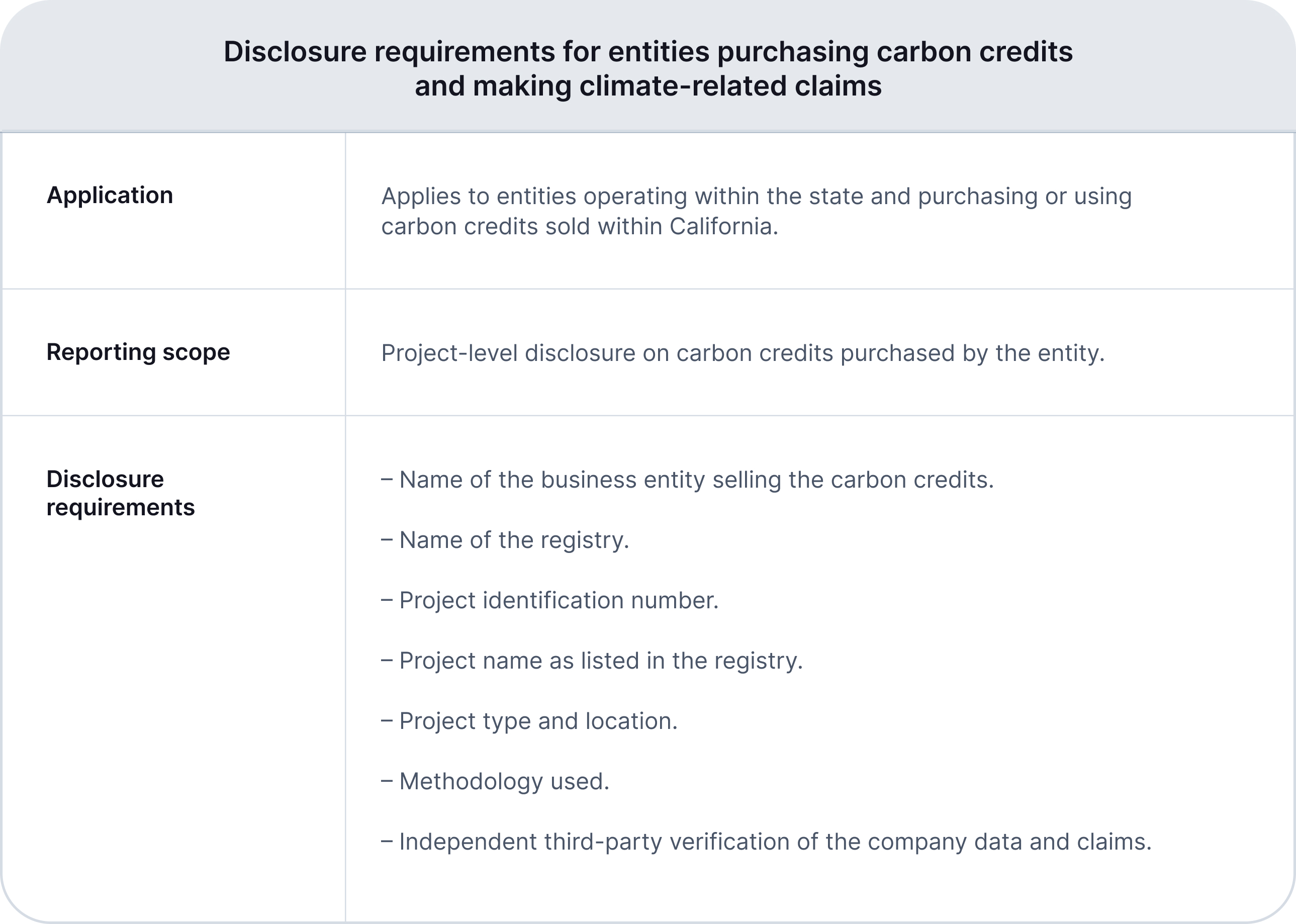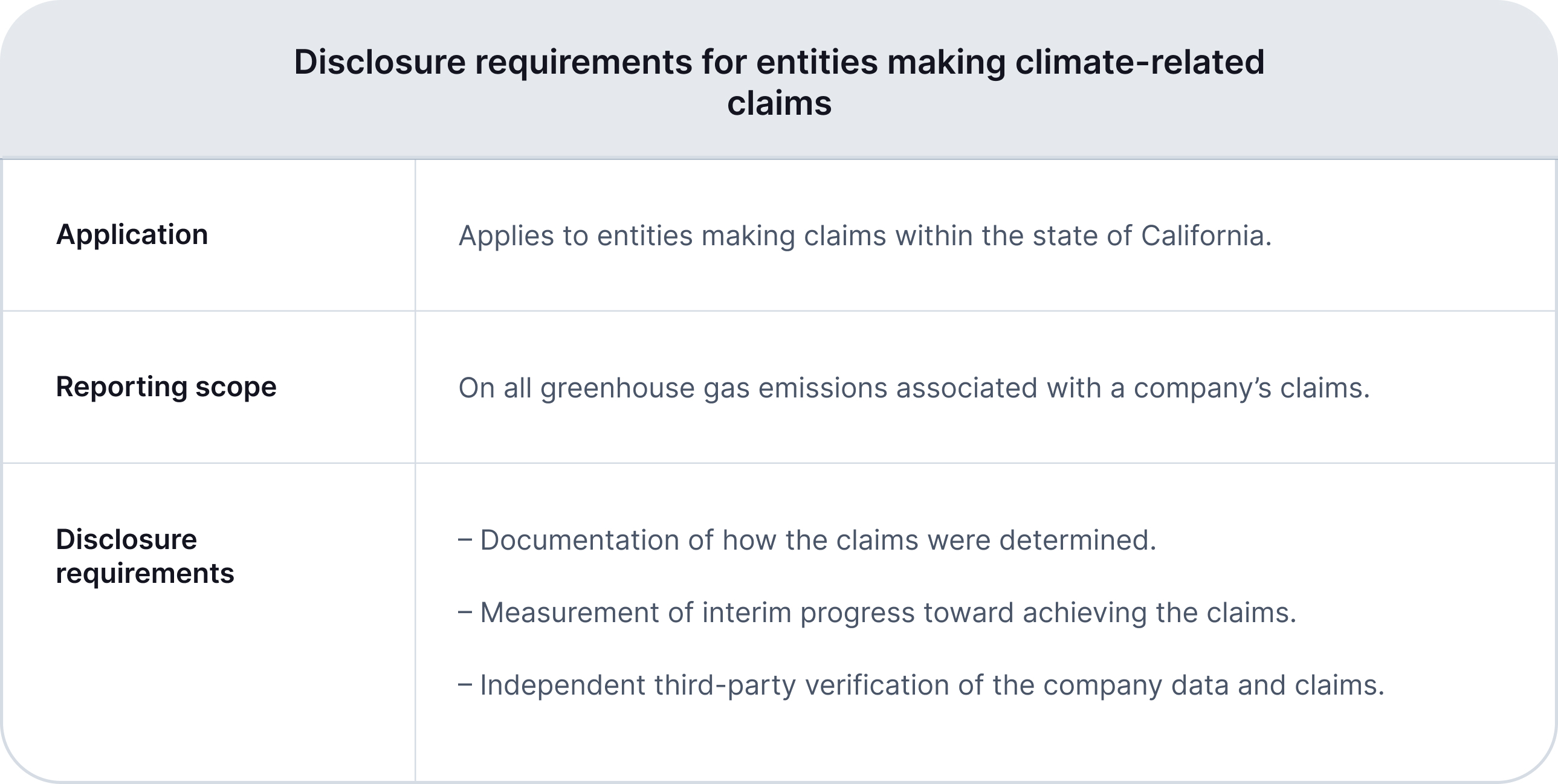Three critical new pieces of regulation for California–and potentially for the rest of the world–are close to being enforced in the state.
The following bills have been signed into law this October, and aim to tighten requirements for large companies to disclose their greenhouse gas (GHG) emissions and carbon credit purchasing:
- SB 253 (Climate Corporate Data Accountability Act, or CCDAA) and SB 261 (Climate-Related Financial Risk Act, or CRFRA) introduce first-in-the-nation greenhouse gas and climate-related financial risk disclosure requirements.
- AB 1305 (Voluntary Carbon Market Disclosures Act, or VCMDA) requires businesses involved in voluntary carbon markets in California to provide detailed information about carbon credit projects, accountability measures, and transparency regarding emissions claims.
These new requirements have global repercussions, as California is the fifth-largest economy in the world. Similar to the EU, the state has taken an expansive approach by requiring disclosures from any company with business in the state, rather than focusing solely on companies with headquarters or the majority of their business in California. In short: Many companies will be affected.
California is leading the way on climate disclosure requirements
Let’s start with the first two bills – the Climate Corporate Data Accountability Act (CCDAA) and Climate-Related Financial Risk Act (CRFRA).
The CCDAA requires companies that do business in California and have more than $1 billion in total annual revenue to publicly disclose their Scope 1, 2, and 3 emissions to a dedicated reporting organization, from 2026 onwards. This bill applies to both public and private companies and will affect over 5,000 businesses operating in California.
The CRFRA mandates the submission of reports that address climate-related financial risks in accordance with the recommendations from the Task Force on Climate-Related Financial Disclosure (TCFD) framework. The first report must be prepared by 2026, with subsequent reporting occurring every two years. It applies to US entities that operate in California and have a total annual revenue of at least $500 million.
Companies must substantiate climate-related claims, or else they may face fines of up to $0.5 million
Now for the second bill – Voluntary Carbon Market Disclosures Act (VCMDA).
Effective in less than three months (January 2024), VCMDA introduces requirements for companies involved in marketing, selling, or purchasing carbon credits within the state of California. Each of these activities carries specific public disclosure requirements under the VCMDA.
Let’s focus on the requirements for companies making climate-related claims. In the document, a specific reference is made to “claims regarding the achievement of net-zero emissions, claims that the entity, related entity, or a product is ‘carbon neutral,’ or makes other claims implying the entity, related entity, or a product does not add net carbon dioxide or greenhouse gases (GHG) to the climate or has made significant reductions to its carbon dioxide or greenhouse gas emissions”
Below is a summary of the disclosure requirements. The first set of requirements applies to entities operating within the state of California and purchasing or using carbon credits sold within the state. These requirements only seem to apply if the company makes a climate-related claim, but that could potentially be interpreted broadly.

The second set of requirements applies to entities making claims within the state of California, regardless of whether they purchase carbon credits.

Disclosure under the VCMDA must be published on company websites and updated at least annually. These requirements take effect in January 2024, requiring covered companies to act quickly to prepare relevant disclosure.
To prepare to comply with the new law, any company making climate-related claims or transacting in the voluntary carbon market should start gathering the data and methodologies that substantiate their claims and project benefits.
Failure to comply with these requirements can lead to significant civil penalties – up to $2,500 per day, per violation, not exceeding a total of $500,000.
Other upcoming requirements around the globe
These bills are part of a global movement towards legislation that requires companies to provide comprehensive climate reporting. We're moving into a time where sustainability reporting is as crucial as financial disclosures.
At the US federal level, the Securities and Exchange Commission (SEC) is finalizing rules proposed last year. These rules would potentially mandate public companies to disclose information about their use of carbon credits, the role of carbon credits in their climate-related business strategy, and the associated costs and risks of adopting carbon credits, including regulatory and market-based risks.
Simultaneously, the FTC is revising its Green Guides to offer clearer guidelines on what constitutes deceptive advertising for climate-related claims. Additionally, the Commodity Futures Trading Commission (CFTC) established an Environmental Task Force in June 2023 to ensure integrity in the voluntary carbon market.
As published on CEEZER's website, the CSRD will mandate sustainability reporting from companies operating in the EU starting in 2025. The ESRS E1 Climate Change includes specific requirements around GHG emissions, net-zero targets, climate-related claims, and carbon credits. It obliges companies to do detailed reporting of their insetting efforts (carbon removal within the value chain) as well as their carbon credit portfolios (beyond the value chain).
While there is still uncertainty surrounding the evolving regulatory landscape, one thing is certain: companies purchasing carbon credits or make climate-related claims should start preparing for more stringent substantiation and reporting requirements, even if they are not currently subject to legal obligations.
How CEEZER helps you to comply with the VCMDA and Beyond
To comply with the VCMDA, companies must be prepared to disclose the data that substantiates any climate-related claims made. To facilitate these disclosures on the company website, a robust record-keeping program is needed.
With CEEZER, you can easily build, manage, and report on an impactful portfolio aligned with your climate action goals. The platform's data-rich insights empower you to fulfill carbon credit reporting requirements seamlessly – right out of the box.
Data access
Through a collaboration with CEEZER, businesses meet these VCMDA requirements with ease in 2024 by gaining access to a wealth of information for each credit, including:
- Project name as listed in the registry and the project’s identification number
- Name of the entity from which the carbon credits were purchased
- Classification of projects into different types and technologies, clearly distinguishing between nature-based and engineered removal initiatives with indication of permanence using the Oxford Category classification
- Respective quality standard that issued the credit (ICROA-endorsed or new registries), its current verification status, and the respective VVB
- Geographical locations of projects
- Methodology that is used to quantify a project’s impact
- Data substantiating the credibility and integrity of the utilized carbon credits
Efficient portfolio management
CEEZER allows you to manage credit retirements, import and verify credits, and monitor portfolio composition and quality. Even credits procured outside of CEEZER are effortlessly integrated, with the platform automatically mapping credit fundamentals to ensure a holistic portfolio overview.
Seamless reporting
To comply with the VCMDA, companies must be prepared to disclose the data that substantiates any climate-related claims on their website. CEEZER simplifies this task, enabling you to generate public pages containing key data from your carbon credit portfolios effortlessly.
In the ever-changing landscape of environmental regulations, staying ahead of upcoming reporting requirements is crucial. Do not hesitate to contact us if you want to learn more about upcoming reporting requirements or book a demo today to see how our team and platform can help you.
.jpg)
.jpg)




